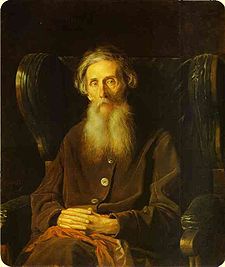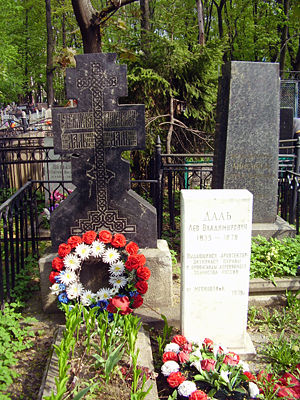- Vladimir Dal
-
Vladimir Dal
Владимир Даль
Володимир Даль
Dal's portrait by Vasily PerovBorn November 10, 1801
Luhansk, Yekaterinoslav Governorate, Russian EmpireDied Moscow, Russian Empire
September 22, 1872 (aged 70)Fields Lexicography Known for Explanatory Dictionary of the Living Great Russian Language Vladimir Ivanovich Dal (alternatively transliterated as Dahl; Russian: Влади́мир Ива́нович Даль; Ukrainian: Володимир Іванович Даль, Volodymyr Ivanovych Dal; November 10, 1801 – September 22, 1872) was one of the greatest Russian language lexicographers. He was a founding member of the Russian Geographical Society. He knew at least six languages including Turkic and is considered to be one of the early Turkologists. During his lifetime he compiled and documented the oral history of the region that was later published in Russian and became part of modern folklore.
Contents
Early life
His father was a Danish physician named Johan Christian von Dahl (1764 – October 21, 1821). He was a linguist versed in German, English, French, Russian, Yiddish, Latin, Greek and Hebrew languages. His mother, Maria Freitag, was of German and French descent (Huguenots). She spoke at least five languages and came from a family of scholars.
The future lexicographer was born in the town of Lugansky Zavod, in Novorossiya under the jurisdiction of Yekaterinoslav Governorate, part of Russian Empire, which is now Luhansk, Ukraine.
Novorossiya was part of Russian colonization, where Russian was imposed as a common language in cities, but the Ukrainian remained prevalent in smaller towns, villages, and rural areas outside the immediate control of colonization. On the outskirts, the ethnic composition varied and included such nationalities as Ukrainians, Greeks, Bulgarians, Armenians, Tatars, and many others. Dal grew up under the influence of this various ethnic mixture of people and cultures.
Dal served in the Russian Navy from 1814 to 1826, graduating from the St Petersburg Naval Cadet School in 1819. In 1826, he began studying medicine at Dorpat University and took part as a military doctor in the Russo-Turkish War (1828–1829) and the campaign against Poland in 1831–1832. Following disagreement with his superiors, he resigned from the Military Hospital in St. Petersburg and took an administrative position with the Ministry of the Interior in Orenburg Governorate, serving in similar positions in St. Petersburg and Nizhny Novgorod before his retirement in 1859.
Dal was interested in language and folklore from his early years. He started traveling by foot through the countryside, collecting sayings and fairy tales in various Slavic languages from the region. He published his first collection of fairy-tales in 1832 in Russian language. Some others, yet unpublished, were put in verse by his friend Alexander Pushkin, and have become some of the most familiar texts in the Russian language. After Pushkin's fatal duel, Dal was summoned to his deathbed and looked after the great poet during the last hours of his life. In 1838, he was elected to the Russian Academy of Sciences.
Lexicographic studies
In the following decade, Dal adopted the pen name Kazak Lugansky ("Cossack from Luhansk") and published several realistic essays in the manner of Nikolai Gogol. He continued his lexicographic studies and extensive travels throughout the 1850s and 1860s. Having no time to edit his collection of fairy tales, he asked Alexander Afanasyev to prepare them for publication, which followed in the late 1850s. Joachim T. Baer wrote:
While Dal was a skilled observer, he lacked talent in developing a story and creating psychological depth for his characters. He was interested in the wealth of the Russian language, and he began collecting words while still a student in the Naval Cadet School. Later he collected and recorded fairy tales, folk songs, birch bark woodcuts, and accounts of superstitions, beliefs, and prejudices of the Russian people. His industry in the sphere of collecting was prodigious.[1]
His magnum opus, Explanatory Dictionary of the Live Great Russian language, was published in four huge volumes in 1863–1866. The Sayings and Bywords of the Russian people, featuring more than 30,000 entries, followed several years later. Both books have been reprinted innumerable number of times. Baer says: "While an excellent collector, Dal had some difficulty ordering his material, and his so-called alphabet-nest system was not completely satisfactory until Baudouin de Courtenay revised it thoroughly in the third (1903–1910) and fourth (1912–1914) editions of the Dictionary."[1]
Dal was a strong proponent of the native rather than adopted vocabulary. His dictionary began to have a strong influence on literature at the beginning of the 20th century; in his 1911 article "Poety russkogo sklada" (Poets of the Russian Mold), Maximilian Voloshin wrote:
Just about the first of the contemporary poets who began to read Dal was Vyacheslav Ivanovich Ivanov. In any case, contemporary poets of the younger generation, under his influence, subscribed to the new edition of Dal. The discovery of the verbal riches of the Russian language was for the reading public like studying a completely new foreign language. Both old and popular Russian words seemed gems for which there was absolutely no place in the usual ideological practice of the intelligentsia, in that habitual verbal comfort in simplified speech, composed of international elements.[2]
While studying at Cambridge, Vladimir Nabokov bought a copy of Dal's dictionary and read at least ten pages every evening, "jotting down such words and expressions as might especially please me"; Alexander Solzhenitsyn took a volume of Dal with him as his only book when he was sent to the prison camp at Ekibastuz.[3] The encompassing nature of Dal's dictionary gives it critical linguistic importance even today, especially because a large proportion of the dialectal vocabulary he collected has since passed out of use. The dictionary served as a base for Vasmer's Etymological dictionary of the Russian language, the most comprehensive Slavic etymological lexicon.
For his great dictionary Dal was honoured by the Lomonosov Medal and honorary fellowship in the Russian Academy of Sciences. He is interred at the Vagankovskoye Cemetery in Moscow. To mark the 200th anniversary of Vladimir Dal's birthday, UNESCO declared the year 2000 The International Year of Vladimir Dal.
Legacy
- In 1986 a museum in Moscow, Russia, was opened in honor of Vladimir Dal.
- In Luhansk, Ukraine, the home of Vladimir Dal has been converted into a Literary Museum where the employees managed to collect the lifetime editions of Dal's complete literary works.
- In 2001, a Luhansk (Ukraine) university was named after Vladimir Dal, the East Ukraine Volodymyr Dahl National University (drom his name in Ukrainian).[4]
Controversy
Vladimir Dal worked in Ministry of Domestic Affairs, the chief administrative center of minister (1841). His responsibilities included overseeing investigations of murders of children in the western part of Russia.
In 1844 the Ministry of Domestic Affairs printed a classified (for internal usage) document in 10 copies – "Investigation of the Murder of Christian Babies by Jews and the Use of Their Blood" (Russian: Розыскание о убиении евреями христианских младенцев и употреблении крови их), which asserted Blood Libel. The author's name was not specified on its cover.[5] It was actually written by V. Skripitsyn, a privy councillor at the Ministry. In the outbreak of antisemitism in Russia after 1880 it was republished with the ascription to Vladimir Dahl to lend it more credence, and it gained notoriety as one piece of purported evidence presented in court hearings during the Beilis affair.[6]
References
- ^ a b Terras, Handbook of Russian Literature, p. 92.
- ^ Maximilian Voloshin, "Поэты русского склада," in Sovremenniki (Russian text).
- ^ Brian Boyd, Vladimir Nabokov: The Russian Years (Princeton University Press, 1993), p. 171.
- ^ official website East Ukraine Volodymyr Dahl National University – History section
- ^ Розыскание о убиении евреями христианских младенцев и употреблении крови их. [СПб.]: Напечатано по приказанию г. Министра Внутренних Дел. 1844. http://www.dazzle.ru/antifascism/zoru-0.shtml. Retrieved February 11, 2011.
- ^ http://www.vestnik.com/issues/2000/0118/win/reznik.htm
Sources
- Dal, Vladimir, Explanatory Dictionary of the Live Great Russian language, Vol.I, Diamant, Sankt Peterburg, 1998 (reprinting of 1882 edition by M.O.Volf Publisher Booksellers-Typesetters)
- Terras, Victor, Handbook of Russian Literature (Yale University Press, 1990), ISBN 0300048688
External links
Categories:- 1801 births
- 1872 deaths
- People from Luhansk
- Russian lexicographers
- Russian linguists
- Russian writers
- Dialectologists
- Collectors of fairy tales
- Russian language
- Members of the Russian Academy of Sciences
- Slavophiles
- Burials at Vagankovo Cemetery
- Russian people of the Polish–Russian War (1830–1831)
- Russian people of German descent
- Russian people of Danish descent
- Converts to Eastern Orthodoxy from Protestantism
Wikimedia Foundation. 2010.


